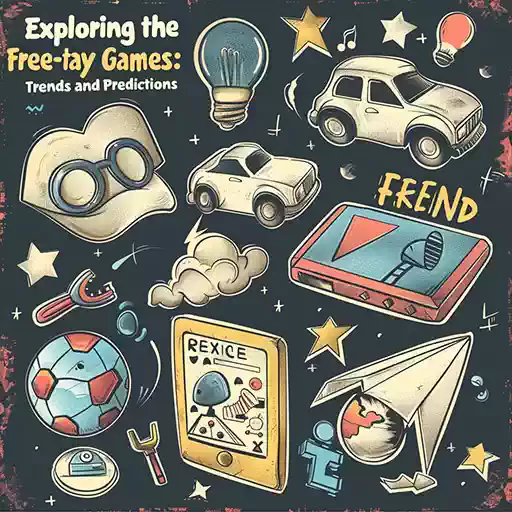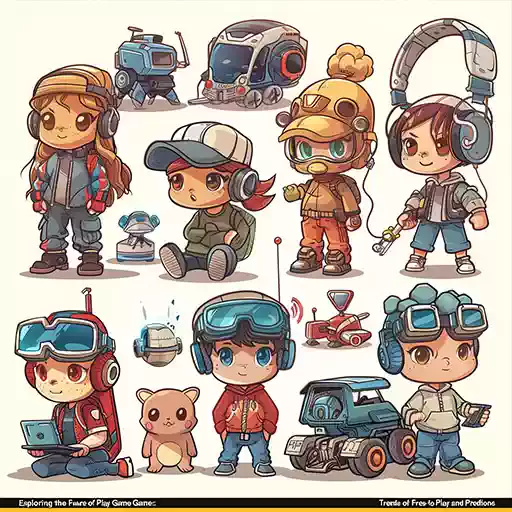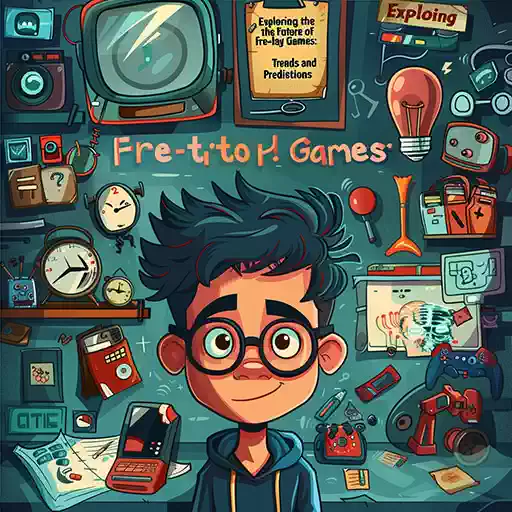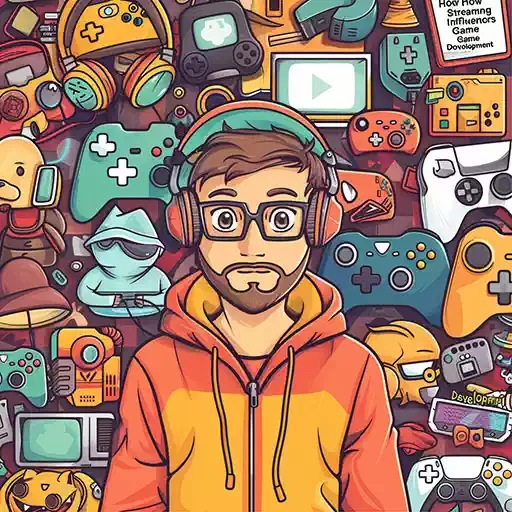Exploring the Future of Free-to-Play Games: Trends and Predictions
But what does the future hold for free-to-play games? In this article, we’ll dive deep into the emerging trends and make some bold predictions about where this booming industry is headed. Whether you're a game developer, a player, or just curious about the evolution of digital entertainment, this is your guide to what’s coming next.

The Evolution of Free-to-Play Games
Before we look ahead, it’s crucial to understand how the free-to-play model has evolved. Remember the days when paying for a game meant getting the full package? That’s all changed with free-to-play, where the base game is free, but players can choose to spend on extras like cosmetics, in-game currency, or premium content. Games like Fortnite, Genshin Impact, and League of Legends have shown that, with the right approach, free-to-play can generate billions in revenue.From Mobile to PC and Console
Initially, free-to-play games were mainly focused on mobile platforms. They were easy to pick up, didn’t require a major investment, and had wide appeal across various demographics. But now, the free-to-play model has expanded far beyond mobile. We’re seeing AAA-quality free-to-play games on PC and consoles. Titles like Apex Legends and Call of Duty: Warzone are prime examples of how the model has successfully entered the competitive landscape of high-end gaming.How Did Free-to-Play Become So Successful?
The success of free-to-play games hinges on their accessibility. Anyone can download and start playing without spending a dime. But what keeps players hooked and willing to pay for in-game content? The answer lies in the clever use of engagement mechanics such as daily rewards, progression systems, and time-limited events. These features create a sense of urgency and encourage players to invest, not just their time, but also their money.
Key Trends Shaping the Future of Free-to-Play Games
So, what’s next? Free-to-play isn’t going anywhere, but it’s certainly evolving. Below are some key trends that will likely shape the future of this gaming model.1. Subscription-Based Enhancements
As players become more familiar with free-to-play games, they’re also seeking more value for their money. While in-game purchases and microtransactions will continue to dominate, we’re likely to see a rise in subscription-based models within free-to-play games. Think of it like a season pass, but on a broader scale.Games like Fortnite and Call of Duty have already introduced battle passes that offer players exclusive rewards for a set fee. But going forward, we could see subscription services offering more than just cosmetic items. Exclusive in-game events, premium access to new game modes, and even early access to future content could be bundled into a monthly or annual subscription. This shift would create a more predictable revenue stream for developers while offering players a clear value proposition.
2. Cross-Platform Integration and Play
One of the biggest shifts in the gaming world has been the rise of cross-platform play. It’s no longer just a feature; it’s becoming the standard. Players now expect to be able to play with their friends, regardless of whether they’re on PC, console, or mobile.The future of free-to-play games will see even more integration between platforms, allowing players to seamlessly switch between devices without losing progress. This will not only improve the player experience but also increase the potential audience for a game. Why limit yourself to just one platform when your game can be played everywhere?
3. Emergence of Blockchain and NFTs in Free-to-Play
The blockchain and NFT (Non-Fungible Token) wave has already started to make its way into gaming, and it’s set to revolutionize the free-to-play space. In the future, we could see games that allow players to own and trade unique in-game assets on the blockchain. Imagine earning a rare item in a free-to-play game and then being able to sell or trade it with other players for real-world value.This concept is already being tested in games like Axie Infinity, and as blockchain technology becomes more accessible, we can expect more developers to explore this space. While there’s still some skepticism around blockchain gaming, the potential for player-driven economies is immense.
4. Increased Focus on Esports and Competitive Play
Esports has grown from a niche community into a multi-billion-dollar industry, and free-to-play games are at the forefront of this movement. Titles like League of Legends, Fortnite, and Valorant have shown how the free-to-play model can thrive in the competitive gaming scene.In the future, expect to see more free-to-play games specifically designed with esports in mind. Developers will continue to refine the balance between accessibility for casual players and the high skill ceiling required for competitive play. This trend will also drive more in-game tournaments, where players can compete for real-world prizes, further blurring the line between gaming and professional sports.
5. Adapting to Changing Player Expectations
The gaming community is evolving, and with it, player expectations are changing. Gamers today are savvier, and they’re looking for more than just a quick fix or flashy graphics. Story-driven content, emotional engagement, and social interaction are becoming crucial elements in free-to-play games.In response, developers will need to focus on creating richer, more immersive experiences. This could mean deeper narratives, more meaningful choices, and even collaborative gameplay experiences that allow players to form lasting connections. Essentially, the future of free-to-play games will hinge on their ability to offer something truly unique and engaging to keep players coming back.

Predictions for the Future of Free-to-Play Games
What does the next decade look like for free-to-play games? While it’s impossible to predict every twist and turn, here are a few bold predictions based on current trends.1. Hybrid Monetization Models Will Dominate
We’ve already seen free-to-play games explore different revenue streams, but in the future, expect hybrid monetization models to become the norm. This means a combination of in-game purchases, subscriptions, advertisements, and perhaps even blockchain-based ownership of in-game assets.2. More AAA Free-to-Play Titles
The stigma that once surrounded free-to-play games as “cheap” or “low-quality” has faded. As the business model proves successful, more AAA developers will shift to free-to-play, offering top-tier gaming experiences at no upfront cost. Expect to see big-name franchises experimenting with this model, blurring the lines between free-to-play and traditional premium games.3. Greater Regulation and Consumer Protection
As the free-to-play model grows, so too will the need for regulation. Issues like loot boxes, pay-to-win mechanics, and data privacy have already raised red flags among governments and consumer protection agencies. In the future, we’re likely to see stricter guidelines and regulations that ensure fair play and protect player rights.
Conclusion: The Future Is Free (to Play)
The free-to-play model has come a long way, and it's clear that it’s here to stay. With trends like subscription-based content, cross-platform play, and blockchain integration, the future of free-to-play games promises to be more dynamic and innovative than ever. Whether you’re a developer looking to break into the market or a player eager for the next big thing, one thing is certain: the future of gaming is free, and it's packed with potential.So, are you ready to embrace what’s next in the world of free-to-play games? The possibilities are endless, and the future is brighter than ever!
9 October 2024
More articles

In the world of gaming, it’s not just the immersive worlds, captivating storylines, or exhilarating gameplay that keep players coming back—it’s the sense of community that often forms around these experiences. From sharing strategies and tips to celebrating achievements and creating fan art, gaming communities have become a central aspect of modern game culture. For game developers like FOGYX, building and nurturing these communities is not just an added bonus—it’s essential to the success and longevity of our games, especially in the ever-evolving landscape of free online games.

In the digital age, online games and free games are no longer solely shaped by developers sitting behind computer screens. The gaming landscape has evolved, and with it, the ways in which games are created, marketed, and played. One of the biggest driving forces behind this change is the rise of streaming platforms and content creators. These individuals, who broadcast their gameplay to massive audiences on platforms like YouTube and Twitch, have become powerful influencers in the gaming world.

When you think about what makes a game truly immersive, what comes to mind? Is it the stunning visuals, the captivating storyline, or the detailed characters? While all these elements play a role, one often overlooked but critical aspect is the physics engine. Physics in games goes beyond simple aesthetics—it’s the unseen force that makes everything in a virtual world behave in a way that feels believable.
all articles
